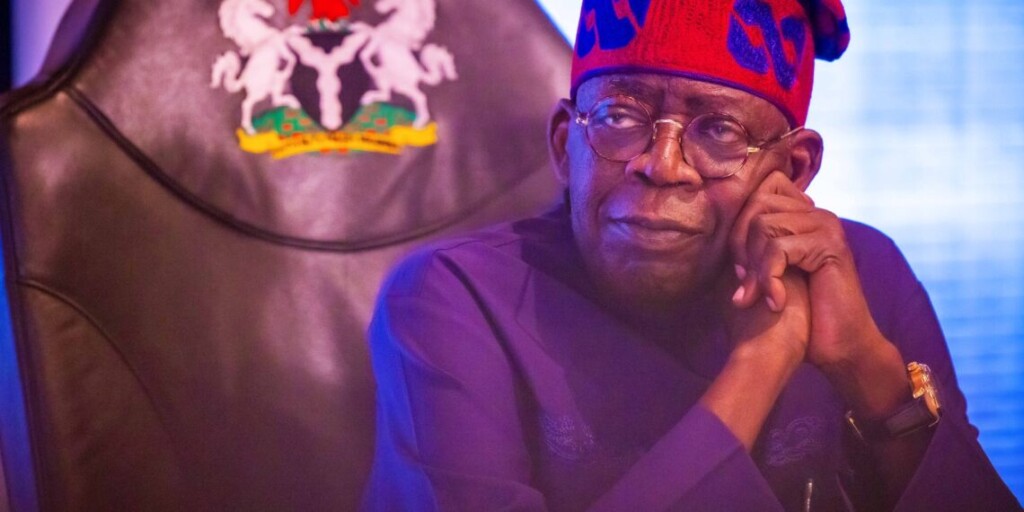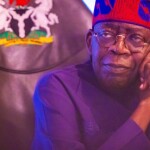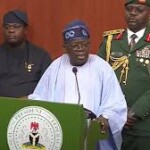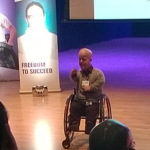In their clamour for employment quota in President Tinubu administration, the Nigerian disability communities are barking up the wrong tree
By Gideon Oladimeji
Nigeria’s President Bola Tinubu and his council of war are putting together a cabinet for the new administration, and the Nigerian disability community are stirring in discomforts.
Their headaches, no doubt, are different from Tinubu’s—though both were in the same boat at some point. He had been kneecapped for months, and even spent a while more in rehabilitation before he eventually bid for Nigeria’s top job in 2021. His temporary disability became a stigma and a broad brush his rivals used to tar him as a political misfit that INEC should exclude from contesting. But the former governor fended off the discrimination, forged ahead and contested the February election. He has since landed himself the job of leading over 200 million Nigerians.
Those with permanent disabilities among them, about 35 million strong, including the Centre for Ability Rehabilitation and Empowerment (CARE), the Inclusive Friends Association (IFA), the ruling APC caucus with disabilities, and others now worry. Tinubu, they fear, might go the way of past administrations. History of government discrimination against PWDs bears them witness. And for defence, they have grabbed what comes handy: making demands that no law clearly guarantees except in their imagination, and screaming blue murder while Tinubu knocks up his cabinet.
In 2015, of his own magnanimity during payback, former President Muhammadu Buhari appointed just one PWD—among his over 100 special advisers and aides. He reappointed Samuel Ankeli for a second term in 2019. That was the year the Discrimination Act 2018 kicked in. Its Section 29 mandates “employers of labour”—those paymasters subject to the Employee Compensation Act (ECA) 2010 which protects career civil servants, government contractors, apprentices, and private sector employees— to staff five percent of their organizations with PWDs. “These appointees are engaged as the employees of the federal government whether as ministers or advisers or aides,” Ikem Uche, the national president, Association of Lawyers with Disabilities in Nigeria (ALDIN), told ER. He tried to dispel the insinuation of a grey area that permitted Buhari then, and Tinubu now, to bend this rule, or give it short shrift when making political appointments. The jury is still out on that—whether the federal cabinet falls under the ECA. Lukman Salami, a lawyer and chairman, the National Association of the Blind, Lagos, said, “They are misconstruing the section and the Act.” According to him, those clamouring are relying on either section 30 or 32 which talks about encouragement of participation of PWDs in politics.
But Buhari himself signed this seeming ambiguity into law. And, like in the mood to simply keep the PWDs sweet in a one-off raffle, he reappointed only one person from among them.
Ankeli got blindsided when he first aspired to the National Assembly. His party told him a blind person can never represent Benue in the House of Reps. And when rewarding his foot soldiers, too, Buhari considered the veterinary doctor and former lecturer worthy of only one thing: soliciting him with disability advice.
Most of the handful of PWDs in state governments across the nation have a trajectory similar to Ankeli’s. They are a chosen few, fenced in with their disabilities.
Thirty six PWDs contested across the three government levels in the 2023 election cycle, according to the Inclusive Friends Association’s Executive Director Grace Jerry. INEC, under Mahmoud Yakubu, has no official figure of the PWDs that contested, won, or lost. Certainly, their number is of no significance. Candidates with disabilities that ever went through the wringer to secure tickets before they lost can tell how grueling the funneling can be. Many of them never got far. Maybe two did: Nasarawa former Gov. Tanko Al-Makura and the current Adamawa Speaker Barthiya Westley. The election management body didn’t respond to ER request for official figures of contestants and winners with disabilities in the last three election cycles.
Those intervening years could have been worse for politicians with disabilities. In its 2019 report, INEC stated 23,111 candidates from 91 parties contested the 1,558 slots available from the presidency to the NASS, state assemblies, and the Federal Capital Territory. The election cycle before then, under Attahiru Jega, had no record, either. But no fewer than 1537 duked it out for the NASS, and 14 from more than 14 parties scrambled for Aso Rock. In all of these, neither the federal government nor INEC has figures of PWDs contesting, no matter how insignificant they are. That dereliction to a minority never occurs to the pollster as anything to worry about. “We will not relent in our effort at ensuring PWDs inclusivity in the electoral process before, during, and after elections,” a state INEC official reassured Nigerians before the last election.
That irony is easy to lose—because it is INEC.
But none can miss the magnitude of self-contradiction and law-breaking, in political exclusion of PWDs, the federal government demonstrates. And the state governments, too.
Since the Discrimination Act took effect, none has honored the 5 percent quota provision—wherever the Section 29 duly applies. Except the federal government wants to take credit for by-passing people with no disabilities to staff the National Commission for People With Disabilities (NCPWD).
Among the 13 states where the law has been adopted, or a version enacted, only Kogi can boast of appointing PWDs in any considerable percentage. Gov. Yahaya Bello, some disability associations believe, has showed commitment both in his administration and the state party’s executive where PWDs hold positions.
On the whole, there is no comparing the disparity in the figures. It is a violation of the quota, at every level.
In states that like to make a virtue of their partial compliance, the appointments are largely in disability commissions, boards, and agencies. Lagos state has been faithful to that since its Special People Law took effect in 2012. A medical doctor with disability chaired the Lagos State Office of Disability Affairs board in 2015. And most of the Office principal officers have been appointed from the community. Other states have professionals in law and other disciplines appointed, too—still as advisers on disabilities.
Only Kogi has broken the mould, spotting abilities in disabilities. One of Yahaya’s media aides comes from the blind community. And many of his appointees with disabilities work in places other than disability commissions and offices.
It may be reasonable then to understand why IFA, CARE, and others started their calls much earlier. It just beggars belief when one considers what they demand. “It is five percent minimum; but we are saying we want 10 percent,” said CARE’s founder Chike Okogwu in May. “So four persons in your (Tinubu) cabinet must be PWDs: two men and two women.”
According to Salami, all of these are political agitations or lobbying. “No statutory backing or justification for the claims,” he said.
Tolu Bankole, the national leader of PWDs in the APC amplified Okogwu’s line. He was encouraged by Hon. Kafilat Ogbara’s July 5 motion. The Lagos rep cited section 29 of the Discrimination Act (which never states 10 percent) to move her colleagues in the Lower Chamber, where there is no PWDs as members, to lend a voice to the 10-percent agitation. They did. But their call is a far cry from CARE’s and Bankole’s. The lawmakers called on SGF George Akume to direct the head of service to mobilize ministries, departments, and agencies to fill up to 10 percent of their personnel with PWDs. No demand on Tinubu for his cabinet quota.
IFA and others have yet to respond to questions ER asks about their takes on the feasibility of the five-percent quota, to start with. But lawyers with disabilities and others in earlier interviews agreed five percent is a fair enough place to begin. With that, the government can prove its respect for its own law. And for whatever may be creating ambiguity in the Act, ALDIN’s president said there is always room for amendment.
But if anything is going to change in the current administration, it has to come from the political willingness to accept the quota provision for PWDs as a right; and its implementation (or appointment) remains equally competitive, and at par with the appointment of others with no disabilities. Not as a reward for election support or campaign efforts. That approach has always ended up with the PWDs served potluck after those the government considers the ‘ablest’ have snapped up portfolios other than disability affairs advisory.
Buhari’s appointment of only one PWD as adviser was the first in Nigeria’s history. It wowed most critics so much so that Buhari got away with such infraction after four years.
For his own administration, Tinubu has options.
And they all come with little or nothing at stake.







